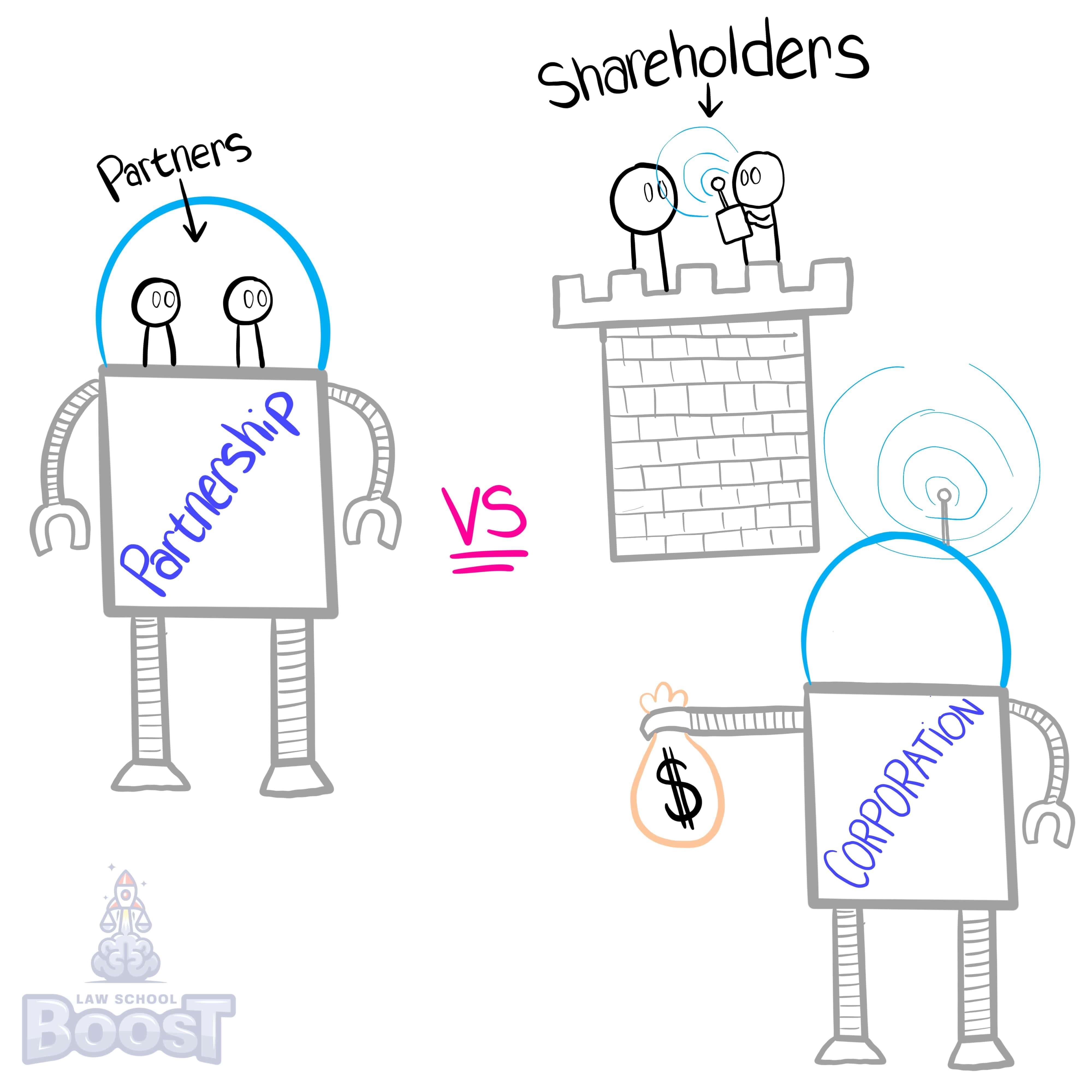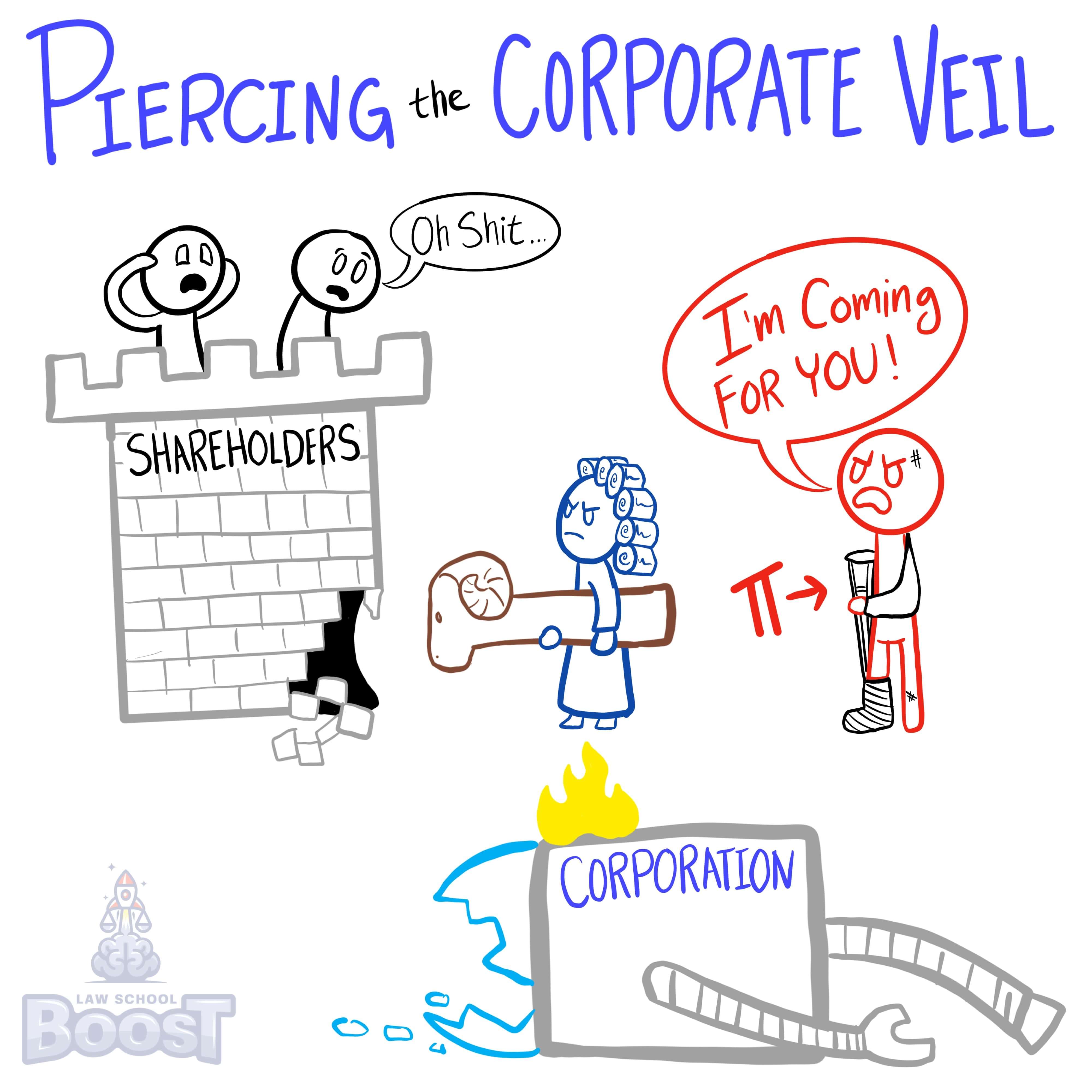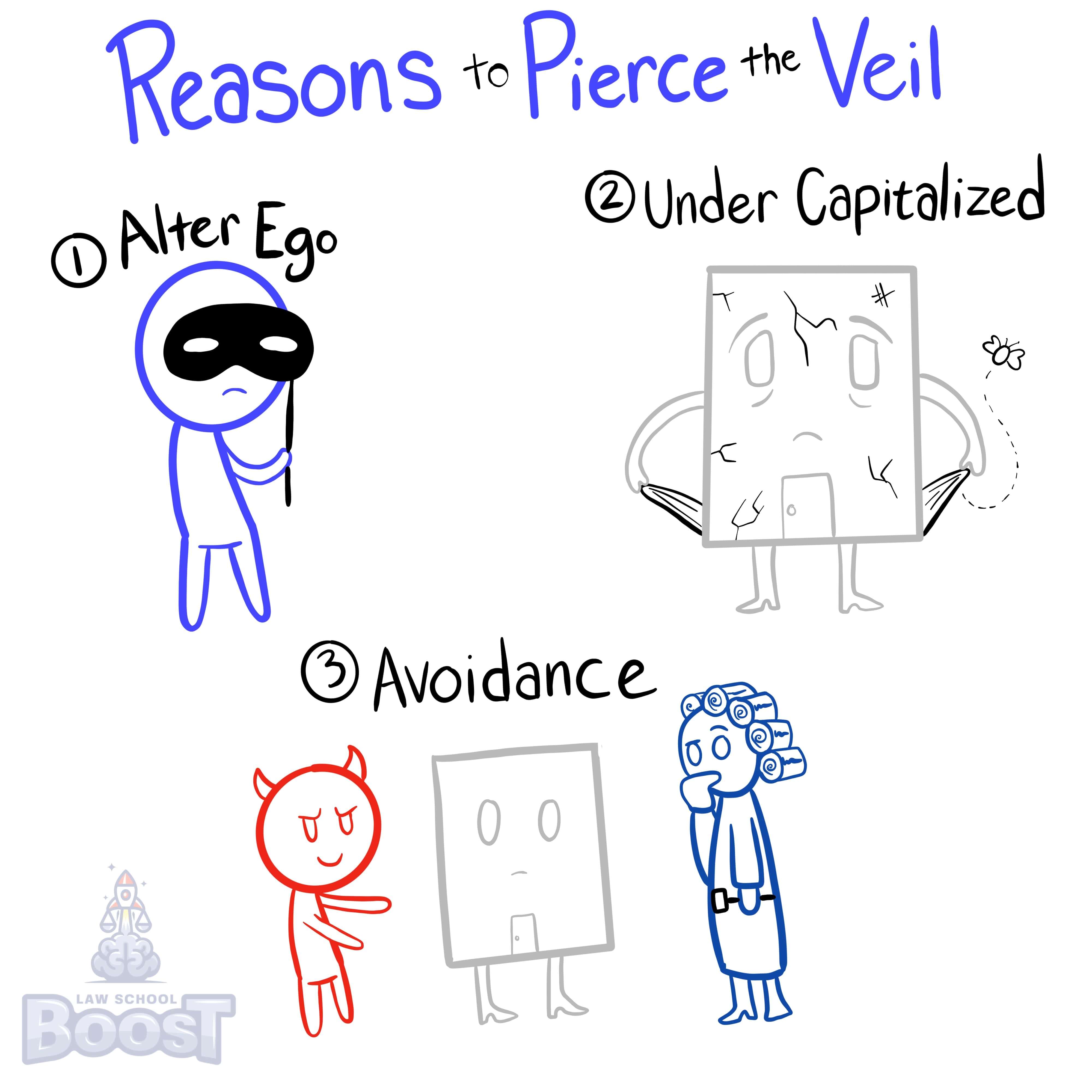🌕
Corporations • Formation Requirements
CORP#016
Legal Definition
Courts will pierce the corporate veil and hold a shareholder personally liable in order to avoid fraud or unfairness. There are generally 3 situations: (1) alter ego, (2) undercapitalization at the time of formation, and (3) avoidance of existing obligations at the time of incorporation or fraud on creditors or other third parties.
Plain English Explanation
The protections provided to shareholders via a corporation are a privilege and, if shareholders act inappropriately, a court is free to revoke those privileges, essentially making the shareholders personally vulnerable to the liabilities of the corporation. There are three main circumstances that may result in a court "piercing the corporate veil" and allowing a plaintiff to directly attack the assets of a corporation's shareholders:
(1) Where the shareholders are merely using the corporation as an alter ego. What does this mean? Corporations are distinct, independent legal entities. In order to maintain this independent status, various formalities have to be followed (things like holding meetings, keeping finances separate, etc.). If shareholders of a corporation are too lazy to properly follow the formalities to maintain the separate, independent status of the corporation, then the corporation may no longer be seen as separate and independent. In other words, if the corporation basically acts as an extension of someone's personal life, then a court will likely deem it to be an alter ego and allow the veil to be pierced.
(2) If a corporation is undercapitalized when it is formed, it may provide evidence to a court that there was never any serious intention to have the corporation actually exist for a business purpose. In other words, it costs money to operate a business which means corporations should be seeded with some initial cash to get going. If the incorporators of a corporation fail to put enough gas in the tank, but then end up getting into a bunch of debt, a court may find it only fair to allow that debt to be paid out of the wallets of the shareholders.
(3) Courts don't like it when people try to incorporate in order to avoid some liability or obligation. For example, imagine if Bob was drunk driving and hit Sam while Sam was walking on the sidewalk. It would be obvious to Bob that Sam is going to sue him for a lot of money. If the next day Bob forms a corporation and transfers all of his assets into it so that he personally owns nothing that Sam can sue for, a court will likely view the timing of this as inappropriate and allow Sam to still attack Bob's assets, even though they are now legally owned by a corporation.
(1) Where the shareholders are merely using the corporation as an alter ego. What does this mean? Corporations are distinct, independent legal entities. In order to maintain this independent status, various formalities have to be followed (things like holding meetings, keeping finances separate, etc.). If shareholders of a corporation are too lazy to properly follow the formalities to maintain the separate, independent status of the corporation, then the corporation may no longer be seen as separate and independent. In other words, if the corporation basically acts as an extension of someone's personal life, then a court will likely deem it to be an alter ego and allow the veil to be pierced.
(2) If a corporation is undercapitalized when it is formed, it may provide evidence to a court that there was never any serious intention to have the corporation actually exist for a business purpose. In other words, it costs money to operate a business which means corporations should be seeded with some initial cash to get going. If the incorporators of a corporation fail to put enough gas in the tank, but then end up getting into a bunch of debt, a court may find it only fair to allow that debt to be paid out of the wallets of the shareholders.
(3) Courts don't like it when people try to incorporate in order to avoid some liability or obligation. For example, imagine if Bob was drunk driving and hit Sam while Sam was walking on the sidewalk. It would be obvious to Bob that Sam is going to sue him for a lot of money. If the next day Bob forms a corporation and transfers all of his assets into it so that he personally owns nothing that Sam can sue for, a court will likely view the timing of this as inappropriate and allow Sam to still attack Bob's assets, even though they are now legally owned by a corporation.
Hypothetical
Hypo 1: Bob creates a corporation, BobCorp. BobCorp doesn't sell anything. Whenever Bob goes to dinner, he calls it a business expense and pays for it via his BobCorp credit card. When Bob bought a car, he registered it under BobCorp but uses it purely for personal reasons, since he doesn't conduct any business. Bob transferred his personal home to BobCorp and pays his property taxes through BobCorp. Bob technically owns nothing, and yet he benefits greatly by enjoying all of BobCorp's assets. One day, Bob is driving his BobCorp car and causes an accident with Sam. Sam sues Bob, and Bob says, "Good luck! I'm broke!" Result: Bob is clearly using BobCorp as an alter ego by commingling his funds and using corporate property as personal property. The court will not be fooled by this attempt to veil his assets and, as a result, Sam should be able to pierce the corporate veil and attack BobCorp's assets as if they were Bob's personal assets, since he treats them like they are.
Hypo 2: Bob is about to turn 21 and wants to have a crazy birthday party in Las Vegas. Bob has a home, a car, and $100,000 in his bank account. Bob knows he's about to go off the rails in Vegas so before his flight, Bob creates a corporation called SaveCorp and transfers all of his assets into it. Now that Bob is legally broke, he heads to Vegas, snorts a rainbow of drugs, gets blackout drunk, and wakes up to his personal version of The Hangover. During his drunken, drugged up blackout, Bob managed to cause $20,000 in damage to his hotel room, wreck a $50,000 rental car, and cause $150,000 in injuries to pedestrians. When Bob is sued by his various victims, he comically pulls out his empty pockets and says, "Good luck, I'm broke!" Result: The court will allow Bob's victims to pierce the corporate veil to SaveCorp because it is obvious that the only purpose of SaveCorp was to conceal and shield his assets from foreseeable victims of his anticipated, reckless birthday adventure.
Hypo 2: Bob is about to turn 21 and wants to have a crazy birthday party in Las Vegas. Bob has a home, a car, and $100,000 in his bank account. Bob knows he's about to go off the rails in Vegas so before his flight, Bob creates a corporation called SaveCorp and transfers all of his assets into it. Now that Bob is legally broke, he heads to Vegas, snorts a rainbow of drugs, gets blackout drunk, and wakes up to his personal version of The Hangover. During his drunken, drugged up blackout, Bob managed to cause $20,000 in damage to his hotel room, wreck a $50,000 rental car, and cause $150,000 in injuries to pedestrians. When Bob is sued by his various victims, he comically pulls out his empty pockets and says, "Good luck, I'm broke!" Result: The court will allow Bob's victims to pierce the corporate veil to SaveCorp because it is obvious that the only purpose of SaveCorp was to conceal and shield his assets from foreseeable victims of his anticipated, reckless birthday adventure.
Visual Aids



Related Concepts
Are bylaws required to form a corporation, and who is allowed to create and modify them?
How broad can a statement of business purpose be?
What are the requirements for articles of incorporation?
What are ultra vires activities and their consequences?
What is a corporation by estoppel and when does it apply?
What is a de facto corporation?
What is a de jure corporation and how is it formed?
What is a foreign corporation and how does it gain the ability to operate?
What is "piercing the corporate veil"?
What is the legal significance of corporate formation?
Why are courts more willing to pierce corporate veils for tort victims?


